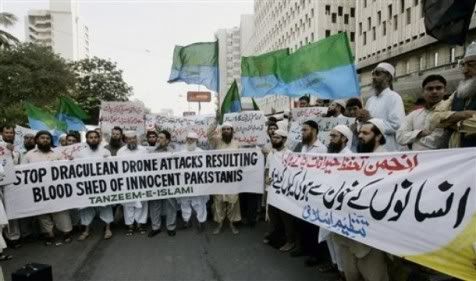The recent visit to Pakistan by the U.S Special Envoy Richard Holbrooke and Admiral Mike Mullen highlighted the growing differences between Pakistan and the United States on how to tackle the threat of Pakistani Taliban. At another level, their visit also signified an emerging consensus between Pakistan’s political leadership and security establishment that it can not afford to give in to the U.S. demands and need to chart a different course.

As a recent Dawn editorial noted, the visiting U.S. team was taken aback by the tone of Pakistani officials. Instead of arm-twisting Pakistan into agreeing to joint military operations in the tribal areas, they were confronted with a barrage of criticism and the visit ended with a rare and public acknowledgment of the differences between the two sides. While the PML-N chief Nawaz Sharif has been forceful in his opposition to these attacks for quite some time, it appears that the Prime Minister Gilani, President Zardari and the COAS Gen. Kiyani has finally thrown their weight behind this argument. Also a recent report from the bipartisan National Security committee condemned such attacks in the “strongest possible manner”.
Ironically its the Americans that deserve most of the “credit” for causing this convergence of thinking in Pakistan. A sustained campaign of charges in the U.S. press against the ISI for its alleged links with militants led by the senior U.S. Generals coupled with the threat of an expansion in drone attacks to cover Baluchistan and settled parts of Pakistan has finally convinced the national leaders to come out against the U.S. plans. Pakistan is also frustrated at the United States for its failure to make Pakistan’s strategic interests in Afghanistan a part of its new strategy for the region.

While it is too early to know if Pakistan can put up enough resistance to stop these attacks by unmanned aircrafts, it is good to see the change in nation’s attitude. Sovereignty is something that you either use or loose and in the case of Pakistan, we have opted for the later for the past 8 years. No one can deny the emerging threat of Taliban emanating from Pakistan’s tribal belt yet no sovereign country can allow such attacks by a foreign power. The western media often cites the killing of high-level Taliban and Al-Qaeda leaders to justify such tactics but they often fail to recognize the impact of such attacks at the strategic level: in addition to the backlash caused by the civilian casualties, these attacks put Pakistan government and army in an impossible situation that they can’t possibly cope with. They have also caused the Taliban to move eastwards into the more settled areas where such attacks are not possible due to population density. A recent report in the Foreign policy magazine summarized the situation as follows:
The US administration justified the drone attacks by claiming it would deny the militants a ‘safe haven’ in Pakistan.‘This line of argument sounds persuasive, but it falls apart on closer examination. For starters, it is not clear that al Qaeda requires a safe haven to do damage, especially since the original organisation has metastasised into smaller groups of sympathisers.’
The magazine pointed out that only a large-scale invasion could eliminate al Qaeda from the region but such an invasion was impossible and therefore there was little reason to continue the drone attacks.
‘US military strikes in Pakistan —even limited ones —tend to undermine the Pakistani government and increase the risk that Pakistan will become a failed state,’ the report noted.



















































This is not about moral judgement, but about a tactic that doesn’t work and has a cost that far exceeds the benefits even in the cold-blooded calculus of realpolitik.
“Of the 60 cross-border predator strikes carried out by the Afghanistan-based American drones in Pakistan between January 14, 2006 and April 8, 2009, only 10 were able to hit their actual targets, killing 14 wanted al-Qaeda leaders, besides perishing 687 innocent Pakistani civilians. The success percentage of the US predator strikes thus comes to not more than six per cent.”
http://www.thenews.com.pk/top_story_detail.asp?Id= 21440
The 5% population these bearded bearers of moral responsibility represent always comes out on the streets because they have a common platform. It’s never the cause, its the ability to mobilise a crowd that this platform provides them. The question remains, what common platform can the 95% normal population of Pakistan find so that they too can come out on the streets and quieten these mobsters once and for all. If these religioulous people really cared about the innocent Pakistani populace, would they attack them when they ran marathons wearing shorts, would they condemn the flogging of a 17 year old woman by demonic maulvis of Swat, would they do something to stop tarnishing Pakistan’s image when they stay silent on suicide bombings and beheadings of foreigners? Would they? This is a boondoggle for them, an extra-curricular activity, a post-mosque social gathering that lets them vent their frustrations. It makes them feel better about themselves. They don’t give a rat’s rear end about Pakistan.